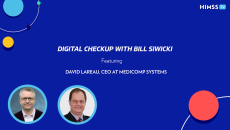Digital Health
Evernow’s new app links women to healthcare providers and helps track symptoms, says founder and CEO Alicia Jackson
Ali Alajme, director of digital health at the UAE Ministry of Health and Prevention, talks about advances in the Emirates' digital transformation.
Ordr CEO Jim Hyman discusses the ways connected-device intelligence can inform hospital networks to manage volume. Harris Health System CISO Jeffrey Vinson talks about the benefits of situational awareness for IoMT security.
How is virtual reality technology finding use in healthcare today? What's stopping it from greater deployment? Where is it headed in 2023? Aaron Gani, CEO of BehaVR, gives insights.
Dr. Azmi Mohammad, an orthopedic surgeon at Raja Isteri Pengiran Anak Saleha Hospital, discusses moving to an EMR system in the digital maturity journey.
Diagnostically connected data can assist progress in interoperability, according to David Lareau, Medicomp Systems CEO, who explains how the 21st Century Cures Act, TEFCA and FHIR figure in.
The physical therapy house call service will first be available in Chicago.
Professors from the Samsung Medical Center explain their work with the South Korean government to transform hospitals into data-driven, research-centered institutions delivering excellent care.
The system's scale has never stopped digital maturity, according to CIO Arvind Sivaramakrishnan. The goal of achieving triple Stage 6 HIMSS Digital Maturity Model validations pulled its teams together.
PharmStars founder and CEO Naomi Fried talks about the company's call for applications to digital health companies that aim to improve women's health and health equity for underserved populations.









